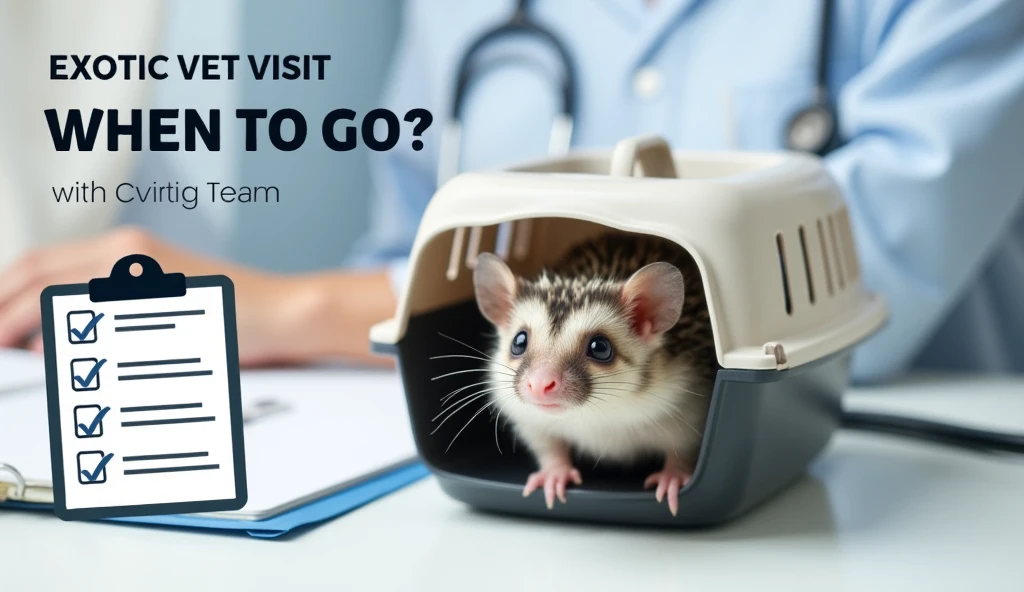Owning an exotic pet like a hedgehog, sugar glider, chinchilla, or ferret comes with unique responsibilities—one of the most important being knowing when to visit an exotic vet. Unlike dogs and cats, exotic mammals often hide signs of illness, making it harder to decide when a vet trip is necessary.
This article will help you recognize the right time to act with a simple, practical checklist for exotic pet owners. Whether you’re a new or experienced owner, keeping this guide in mind could save your pet’s life.

Why Exotic Vets Matter
Exotic animals require specialized care that most standard veterinarians aren’t trained for. Exotic vets are experienced in treating small mammals, reptiles, birds, and other non-traditional pets. That’s why it’s important to establish care with an exotic vet early—before a crisis happens.
General Rule: If You’re Unsure, Go
Exotic animals often decline quickly once symptoms appear. If something seems off, don’t wait too long. It’s better to be cautious than risk losing your pet to an illness that could’ve been treated early.
✅ Exotic Vet Visit Checklist: When to Go Immediately
If your exotic pet shows any of the following signs, visit a vet as soon as possible:
🔴 Emergency Signs
- Refusing to eat or drink for 24+ hours
- Trouble breathing or wheezing
- Bleeding (from mouth, nose, or bottom)
- Seizures or collapsing
- Severe injury or bite wounds
- Paralysis or sudden inability to walk
- Extreme lethargy (won’t move, even when touched)
- Swollen or painful abdomen
- Excessive diarrhea or vomiting
These are critical signs that something is seriously wrong. Do not wait—seek emergency care.
🟡 Schedule a Vet Visit Soon If You Notice:
Behavior Changes
- Sleeping much more than usual
- Suddenly aggressive or withdrawn
- Less active, not using wheel or toys
- Hiding more than normal
Eating or Digestive Issues
- Eating less or becoming pickier
- Changes in poop (loose, green, runny, or dry)
- Signs of bloating or constipation
- Drooling or difficulty chewing
Appearance Changes
- Weight loss or gain
- Bald spots or quill loss
- Dry, flaky, or irritated skin
- Lumps or swelling
- Discharge from eyes, nose, or ears
Breathing and Temperature
- Sneezing or coughing frequently
- Cold feet, belly, or ears (may signal hibernation attempts in hedgehogs)
- Unusual shivering or wobbling
If these signs last more than a day or seem to worsen, book an appointment with an exotic vet promptly.
🟢 Regular Vet Visits to Plan Ahead
Even if your pet seems healthy, it’s a good idea to schedule wellness checkups:
- Once per year for healthy adults
- Every 6 months for older or high-risk pets
- Immediately after adoption to establish care
- Before travel or boarding (some places require a health certificate)
Routine visits help detect hidden issues early and let your vet track your pet’s weight, behavior, and overall health.
Tips Before Visiting an Exotic Vet
- Find an exotic vet before an emergency—don’t wait until something goes wrong
- Keep a journal of any symptoms, changes in diet, or behavior
- Bring a fresh poop sample if digestive issues are present
- Transport your pet in a secure, warm, and quiet carrier
- Bring photos or videos if the behavior is hard to describe
Species-Specific Red Flags
🦔 Hedgehogs
- Wobbling or losing balance
- Refusing food/water
- Quill loss with dry skin
- Cold body or hibernation signs
🐿️ Sugar Gliders
- Not grooming
- Lethargy or refusal to jump
- Overgrooming or biting themselves
- Dehydration (sunken eyes, dry gums)
🐭 Chinchillas
- Wet fur around mouth or eyes
- Overgrown teeth
- Sudden fur loss or skin sores
- Heat stress symptoms (panting, lying flat)
🦦 Ferrets
- Persistent coughing
- Weight loss
- Lumps or growths
- Diarrhea or rectal prolapse
Final Thoughts
Exotic pets may be small, but their health needs are just as big as any cat or dog. Knowing when to visit an exotic vet can make the difference between a quick recovery and a serious health emergency. Trust your instincts, keep a close eye on your pet’s behavior, and never hesitate to call your vet if something feels off.
A quick checkup today could save your pet tomorrow.

